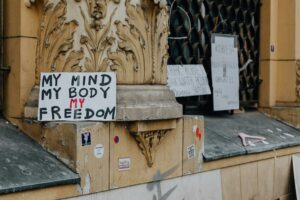This blog is intended to provide a research-based overview of the issues surrounding Planned Parenthood and the ongoing fight for bodily autonomy.
The 21st century has seen significant advancements in the recognition and protection of women’s rights, yet the battle for bodily autonomy remains at the forefront of social and political discourse. Central to this ongoing struggle is Planned Parenthood, a healthcare organization that has become emblematic of the fight for reproductive rights in the U.S. Planned Parenthood was founded in 1916 by Margaret Sanger, who opened the first birth control clinic in Brooklyn, New York. The organization has evolved over the decades, advocating for reproductive rights and access to comprehensive healthcare; now it operates over 600 health centers and serves approximately 2.4 million patients annually, offering services like contraception, cancer screenings, and STI testing. With about 75% of its patients living at or below 150% of the federal poverty level, Planned Parenthood is dedicated to providing accessible healthcare, particularly for underserved communities. From a sociological perspective, the fight for bodily autonomy intersects with broader feminist movements, revealing the complex dynamics of power, gender, and social inequality. This blog delves into the role of Planned Parenthood within this context, exploring how feminist theory and sociological research contribute to our understanding of the ongoing fight for reproductive rights.
Feminism, at its core, advocates for the social, political, and economic equality of all genders; it’s a social movement that aims to establish equality between the sexes. One of the fundamental tenets of feminist theory is the right to bodily autonomy, which asserts that individuals should have the power to make decisions about their own bodies without external coercion. This concept is particularly significant in discussions of reproductive rights, where the control of one’s reproductive health is seen as essential to gender equality.
From a feminist standpoint, a person who believes in legal, political, social, and economic equality, the fight for bodily autonomy is not just about access to healthcare but also about challenging the societal structures that seek to control women’s bodies. These structures are often rooted in patriarchal norms that dictate women’s roles in society, particularly in relation to reproduction and sexuality. Planned Parenthood, by providing reproductive healthcare and advocating for women’s rights, plays a crucial role in resisting these norms and empowering individuals to make informed choices about their bodies.
 Sociology provides a valuable lens through which to examine the broader implications of reproductive rights. The concept of social control is particularly relevant here, as it refers to the informal and formal regulation of members of society to gain conformity and compliance. Reproductive rights, including access to contraception and abortion, are often subject to social control through laws, policies, and cultural norms. These controls can reflect broader societal attitudes toward gender, sexuality, and morality.
Sociology provides a valuable lens through which to examine the broader implications of reproductive rights. The concept of social control is particularly relevant here, as it refers to the informal and formal regulation of members of society to gain conformity and compliance. Reproductive rights, including access to contraception and abortion, are often subject to social control through laws, policies, and cultural norms. These controls can reflect broader societal attitudes toward gender, sexuality, and morality.
Planned Parenthood’s work can be seen as a challenge to these forms of social control, advocating for the decriminalization and destigmatization of reproductive health services. Sociologists have noted that restrictions on reproductive rights disproportionately affect marginalized groups, including low-income women and women of color. These groups often face barriers to accessing healthcare, exacerbating existing social inequalities. By providing services to underserved communities, Planned Parenthood addresses these disparities and promotes social justice.
The legal landscape surrounding reproductive rights in the U.S. has been shaped by landmark Supreme Court decisions, most notably Roe v. Wade (1973), which recognized a woman’s constitutional right to choose to have an abortion. However, this right has been continually challenged by state-level restrictions, such as mandatory waiting periods, parental consent laws, and more. Planned Parenthood has been a key player in challenging these restrictions, often bringing lawsuits to protect access to reproductive healthcare.
In 2022, the Supreme Court’s decision in Dobbs v. Jackson Women’s Health Organization overturned Roe v. Wade, returning the power to regulate abortion to the states. This decision has led to a patchwork of laws across the country, with some states enacting near-total bans on abortion and others expanding access. Most Americans disapprove of the the Supreme Court’s overruling, which had upheld the constitutional right to abortion for nearly 50 years; even before the ruling, support had remained unchanged with 62% of Americans saying it should be legal in all or most circumstances. Planned Parenthood has responded by redoubling its efforts to provide care where legally possible and advocating for federal protections for reproductive rights.
The debate over bodily autonomy is not only a legal issue but also a deeply social and cultural one. Attitudes toward reproductive rights are often influenced by religious, moral, and ethical beliefs, leading to a polarized public discourse. Planned Parenthood, as an organization that provides both educational resources and medical services, plays a crucial role in shaping public understanding of these issues.
In recent years, the rise of social media has amplified the voices of both supporters and opponents of reproductive rights. Planned Parenthood has leveraged these platforms to educate the public on issues related to sexual health and to advocate for policies that support bodily autonomy. However, this has also made the organization a target for misinformation and online harassment.
 While this blog focuses on the United States, it is important to acknowledge that the fight for bodily autonomy is a global issue. In many parts of the world, women’s access to reproductive healthcare is severely limited by legal restrictions, cultural norms, and economic barriers. Organizations like Planned Parenthood work with international partners to advocate for women’s rights globally, recognizing that the struggle for bodily autonomy transcends national borders.
While this blog focuses on the United States, it is important to acknowledge that the fight for bodily autonomy is a global issue. In many parts of the world, women’s access to reproductive healthcare is severely limited by legal restrictions, cultural norms, and economic barriers. Organizations like Planned Parenthood work with international partners to advocate for women’s rights globally, recognizing that the struggle for bodily autonomy transcends national borders.
The fight for women’s rights and bodily autonomy in the 21st century is deeply intertwined with feminist movements and sociological understandings of power, inequality, and social control. Planned Parenthood’s role in this ongoing struggle highlights the importance of access to reproductive healthcare as a cornerstone of gender equality and social justice. As legal, cultural, and social challenges persist, the organization’s work continues to be crucial in ensuring that all individuals have the right to make informed decisions about their bodies and their lives.
Girma is a guest blogger at UITAC Publishing. UITAC’s mission is to provide high-quality, affordable, and socially responsible online course materials.
Images used in this blog:
- “Women Walking on a Street with Banners at a Protest about Womens Rights” by Alfo Medeiros is licensed on Pexels. This image has not been altered.
- “Judges desk with gavel and scales” by Sora Shimazaki is licensed on Pexels. This image has not been altered.
- “Pro Choice Posters at a Building” by Kaboompics is licensed on Pexels. This image has not been altered.




